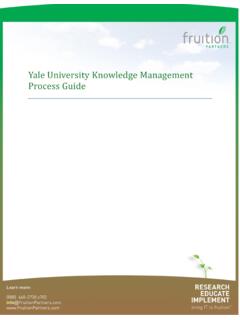Transcription of The Intelligence of Emotional Intelligence
1 Intelligence 17) 433-442 (1993) EDITORIAL The Intelligence of Emotional JOHN D. MAYER university of New Hampshire PETER SALOVEY yale university Intelligence Emotional Intelligence is a type of social Intelligence that involves the ability to monitor one's own and others' emotions, to discriminate among them, and to use the information to guide one's thinking and actions (Salovey & Mayer, 1990). We discuss (a) whether Intelligence is an appropriate metaphor for the construct, and (b) the abilities and mecha- nisms that may underlie Emotional Intelligence . Emotional Intelligence is a type of social Intelligence that involves the ability to monitor one's own and others' emotions, to discriminate among them, and to use the information to guide one's thinking and actions (Salovey & Mayer, 1990). The scope of Emotional Intelligence includes the verbal and nonverbal appraisal and expression of emotion, the regulation of emotion in the self and others, and the utilization of Emotional content in problem solving.
2 The Emotional Intelligence framework organizes the existing individual- differences literature on the capacity to process and adapt to affective informa- tion. Many intellectual problems contain Emotional information that must be processed; this processing may proceed differently than the processing of non- Emotional information. Emotional Intelligence could have been labeled "emo- tional competence," but we chose Intelligence in order to link our framework to a historical literature on Intelligence . Our concept overlaps with Gardner's (1983) "[intra]personal Intelligence ": The core capacity at work here is access to one's own feeling hfe--one's range of affects or emotions: the capacity instantly to effect discriminations among these feelings and, eventually, to label them, to enmesh them in symbolic codes, to draw upon them as a means of understanding and guiding one's behavior.
3 In its most primitive form, the intrapersonal Intelligence amounts to little more than the capac- The authors are indebted to Peter Femald, who directed their attention to materials on emotion and general Intelligence testing. Correspondence and requests for reprints should be sent to John D. Mayer, Department of Psy- chology, Conant Hall, university of New Hampshire, Durham, NH 03824, or Peter Salovey, Depart- ment of Psychology, yale university , Box 11A yale Station, New Haven, CT 06520-7447. 433 434 MAYER AND SALOVEY ity to distinguish a feeling of pleasure from one of pain .. At its most advanced level, intrapersonal knowledge allows one to detect and to symbolize complex and highly differentiated sets of , to attain a deep knowledge feel- ing life. (p. 239) We have been criticized for connecting emotion and Intelligence , both in anonymous reviews of our initial articles and in a symposium where we em- ployed the construct (Wegner, 1990; cf.)
4 Mayer, 1990). Such criticisms raise im- portant issues. They state: (a) that Intelligence is an inappropriate and misleading metaphor, and we are redescribing social Intelligence , as well as perhaps falsely casting dispositions such as interpersonal warmth as abilities; (b) that there are no important abilities connected with emotion, or at least no unique abilities; and (c) finally, there is an objection that we might be "rocking the boat" by connecting a heretofore less controversial area (emotion) with a controversial one (intelli- gence). These criticisms are addressed in this editorial. In it, we pose the question of whether there really is Intelligence to the concept of Emotional Intelligence . We also refine the concept and place it more fully in the context of the Intelligence research tradition. WHY " Emotional Intelligence " MAKES SENSE Emotional Intelligence is Intelligence , and Partially Discriminable From General Intelligence What is (an) Intelligence ?
5 In recent articles, Scarr (1985, 1989) described a tradition that "lumps all manner of human virtues under the banner of several intelligences" (1989, p. 76), which she viewed as a threat to these other areas, as well as to Intelligence research: There are many human virtues that are not sufficiently rewarded in our society, such as goodness in human relationships, and talents in music, dance, and painting. To call them Intelligence does not do justice either to theories of Intelligence or to the personality traits and special talents that lie beyond the consensual definition of Intelligence . Nor does calling all human virtues Intelligence readjust social re- wards, the goal toward which I believe such theories are pointed. (Scarr, 1989, p. 78) Using social competence as an example, Scarf (1989) noted that getting along well with others involves extraversion, self-confidence, low anxiety, and social perceptiveness.
6 Scarr (1989) further noted that, although all of these correlate with Intelligence , they are not Intelligence . We agree, in part. A line--albeit an imperfect one--can be drawn between general personality and Intelligence as follows. Personality traits such as extraversion involve dispositions toward be- Emotional Intelligence 435 havior; Intelligence involves organismic abilities to behave. Although a trait such as extraversion may depend on social skill, or result in it, a trait is a behavioral preference rather than an ability. Knowing what another person feels, in contrast, is a mental ability. Such knowledge may stem from g, or be somewhat indepen- dent of it. The way in which we have defined Emotional Intelligence --as involv- ing a series of mental abilities--qualifies it as a form of Intelligence . Emotional Intelligence May Have Better Discriminant Validity From Gener- al Intelligence Than Social Intelligence .
7 If Emotional Intelligence is partially independent of general Intelligence , it will be of greater theoretical importance. The skills we posit as a part of Emotional Intelligence are usually grouped togeth- er with social Intelligence . Social Intelligence was defined initially as "the ability to understand and manage people" ( Thorndike & Stein, 1937, p. 275). Because social Intelligence can be applied inward, social Intelligence includes also the ability to understand and manage oneself. The concept of social Intelligence has a long history among Intelligence re- searchers (Walker & Foley, 1973). Thorndike (1920) originally distin- guished social from other forms of Intelligence , and defined it as "the ability to understand and manage men and women, boys and girls--to act wisely in human relations" (p. 228). In essence, Thorndike defined social Intelligence asthe ability to perceive one's own and others' internal states, motives, and behaviors, and to act toward them optimally on the basis of that information.
8 Thorndike and Stein (1937) examined responses to the George Washing- ton Social Insight Test and other measures of social Intelligence . They con- cluded that "whether there is any unitary trait corresponding to social Intelligence remains to be demonstrated" (p. 284), but not that this demonstration would be impossible. They concluded that further investigation, relying on scales with less verbal content, might lead to successful measurement of the construct. Cronbach (1960) reviewed this earlier work skeptically, concluding that de- spite "50 years of intermittent investigation .. social Intelligence remains un- defined and unmeasured" (p. 319). Most researchers accepted Cronbach's conclusions that "enough attempts were , to indicate that this line of approach is fruitless" (p. 319; see, , Chlopan, McCain, Carbonell, & Hagen, 1985). The sole basis for his statements and those of others ( ,, Ford & Tisak, 1983; Walker & Foley, 1973), however, was the earlier work by Thorndike and Stein (1937).
9 There is at present a resurgence of interest in social Intelligence (Cantor & Kihlstrom, 1985; 1987; Cantor, Norem, Niedenthal, Langston, & Brower, 1987; Ford, 1982; Sternberg, Conway, Ketron, & Bernstein, 1981; Sternberg & Smith, 1985). Related concepts such as "constructive thinking" have also emerged (Ep- stein, 1986; Epstein & Feist, 1988). But the problem of discriminant validity remains. So much of general Intelligence operates in the social domain that it is not difficult to understand why there has been difficulty in establishing the dis- 436 MAYER AND SALOVEY criminant validity of social Intelligence (Broom, 1928; Keating, 1978; O'Sul- livan, Guilford, & DeMille, 1965; Thorndike, 1936; Thorndike & Stein, 1937). One problem was that social Intelligence was defined so broadly as to blend it imperceptibly into verbal and visuospatial Intelligence . Machiavelli- anism, charisma, and other more prosaic social strategizing all rely on abstract reasoning that cannot be far from general Intelligence .
10 This point can be made with a familiar example from the Wechsler Adult Intelligence Scale (WAIS). The Intelligence test item that asks what one should do having found a letter that was addressed and had a stamp on it, is considered a measure of verbal Intelligence , and yet, to answer the question requires social knowledge and even morality (Wechsler, 1958). Such an item, however, would not fall into the Emotional Intelligence domain, because it is not predominantly involved with the process- ing of emotion. Emotional Intelligence , as compared with social Intelligence , may therefore be more clearly distinguished from general Intelligence as in- volving the manipulation of emotions and Emotional content. As a result, it may have better discriminant validity. There May Be Unique Mechanisms Underlying Emotional Intelligence There are several mechanisms that may underlie Emotional Intelligence : (a) emo- tionality itself; (b) the facilitation and inhibition of Emotional information flow; and (c) specialized neural mechanisms.





